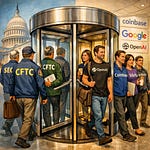Kyle and I are back for another live discussion. I really enjoy these talks because I don't know Kyle's opinion or where his head is at, so we both learn a lot about the topics of the day. I hope you do too.
The Strategic Bitcoin Reserve
The biggest news of the week came from an announcement regarding a U.S. government-controlled Bitcoin reserve. President Donald Trump initially tweeted about forming a “crypto strategic reserve,” but left out Bitcoin and Ethereum from his original statement. An hour later, he followed up, including both assets and clarifying his stance.
However, the reality of this reserve was not as explosive as many had hoped. The U.S. government is not buying more Bitcoin—it’s simply choosing to hold onto the Bitcoin it already has, mostly acquired through civil asset forfeiture. If the U.S. had held onto previously seized Bitcoin instead of selling it, the Treasury would reportedly have an additional $7 billion in its reserves.
The ethical concern here is that this decision creates a perverse incentive. By allowing the government to hold onto seized Bitcoin rather than auctioning it off, it essentially profits from civil asset forfeiture. Historically, seized assets have had to be sold or destroyed. Now, if the government sees an opportunity to benefit from rising Bitcoin prices, could that create undue motivation to seize more crypto assets?
White House Crypto Summit
Following the Strategic Bitcoin Reserve announcement, the White House hosted a Crypto Summit, attended by major industry players such as Michael Saylor (MicroStrategy), Brian Armstrong (Coinbase), the Winklevoss twins (Gemini), Brad Garlinghouse (Ripple), and Tom Emmer (House Majority Whip). The summit served as a meeting of key crypto stakeholders with the Trump administration, but it raised concerns about whether this was a genuine effort to advance crypto policy or simply a pay-to-play scheme.
Many of the attendees were major donors to Trump’s campaign, which raises questions about how much influence money has over crypto regulation. If the people in the room are the ones who will have their projects favored by regulators, then retail investors and smaller projects could be at a serious disadvantage. Additionally, there was little diversity at the summit, with very few women or representatives of decentralized finance (DeFi) projects in attendance.
CZ’s Comments on Long-Term Crypto Investing
Binance’s former CEO, Changpeng Zhao (CZ), made headlines this week by discussing ethical long-term crypto investing. He emphasized the importance of token unlock mechanisms that align with a project’s actual success rather than arbitrary time-based schedules. Too often, venture capitalists dump tokens as soon as they unlock, leaving retail investors to absorb the losses. CZ suggested that token unlocks should be tied to key performance indicators (KPIs) rather than arbitrary schedules, an idea that could help make the space more sustainable.
My Take
The Strategic Bitcoin Reserve might sound like a big deal, but in reality, it’s just the government keeping what it already has. The ethical implications of this move are concerning, as it incentivizes authorities to seize more crypto assets instead of auctioning them off. Imagine if Bitcoin becomes a multi-million-dollar asset—would law enforcement agencies then have even more motivation to seize holdings under questionable circumstances?
The White House Crypto Summit, while significant, felt more like a gathering of donors rather than a legitimate policy discussion. The fact that major industry figures were present is important, but their involvement should not be predicated on campaign contributions. Crypto is supposed to break the cycle of backroom deals, not reinforce it.
CZ’s comments on token unlocks were refreshing because they highlight a serious issue in the industry: the constant dumping of tokens by early investors. Tying unlocks to KPIs rather than arbitrary schedules could help create a healthier investment ecosystem and protect retail investors.
What did you think of our takes. Let us know in the comments or on Spotify.
Happy HODLing, everyone.












